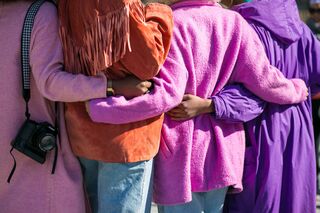Health
Could the Biggest Game Changer in Mental Health Be a Plant?
Learn about the psychedelic described as 10 years of therapy in one night.
Posted August 19, 2022 Reviewed by Ekua Hagan
Key points
- Ayahuasca is a type of plant medicine known for dissolving the ego.
- Exclusive reliance on talk therapy may not be the ideal therapeutic intervention for some people.
- The death of our dysfunctional ego could be the birth of increased empathy toward ourselves and others.
I recently wrote a post describing important factors to consider before taking the psychedelic ayahuasca. That post focused on facts and precautions, whereas this post explores what’s possible, including how this potent plant medicine can impact your psyche and how it holds the potential for collective healing.
My opinions are based on 12 years of contemplation, research, conversations, and ultimately my own experience with ayahuasca. I engaged in 4 nights of ayahuasca ceremony while at a weeklong licensed medical retreat center in Costa Rica, trying a different strain each night (originating from different Amazonian regions).
I came with my own intentions but I also adopted those suggested by the center, which included: Show me who I have become, reunite me with my true self at all costs, and heal my heart. Pretty powerful stuff. Many people, myself included, met those intentions while there. After all, ayahuasca has been described as 10 years of talk therapy in one night.
But how does that happen?
As I mentioned in my first post, ayahuasca dials down the default mode network in the brain that is the home to our ego. We all have an ego, that part of our psyche related to the feelings we have about our own importance and the image we have of ourselves.
Ayahuasca can free people from their dysfunctional ego—the part of us who gets stuck in a need to be right, holds judgment toward ourselves or others, becomes overly focused on self-interests, and over-identifies with our “story” (thinking we are too much, or that we are not enough, or that we will always be the victim of our circumstance, or that we will always be an addict, and so forth). The beliefs of the dysfunctional ego can be pretty rigid and defensive, given they were built in the face of stress and trauma since childhood.
Many people who try ayahuasca report transcending the dysfunctional ego, describing forgiveness of themselves and others, feeling an increase in gratitude, and a reconnection with their soul. People also report feeling more connected to nature, animals, and kindness towards others, rather than focused on competing, comparing, or old grudges.
This led me to wonder what could be possible if these changes in consciousness were widespread. After all, we’re on the heels of a COVID crisis and in the midst of a mental health crisis. We also have a rise in people being angrier and more divisive, which might not be surprising within a culture that puts profits over people. But could ayahuasca’s radically different approach hold the potential to heal disconnection by reconnecting us to our innate empathy?

This also made me wonder if a focus on the “talking cure” in psychotherapy may keep some of us stuck in our dysfunctional ego’s story. Many of the self-help theories out there are sometimes just that: focused so much on the self that they fall short of addressing the larger conflict between people. As a somatic therapist, I’ve long thought that the sole emphasis on talking sometimes isn't enough when it comes to trauma and relationship issues.
I like to imagine a future in which licensed mental health professionals legally have the option to pair talk therapy with ego-freeing methods like ayahuasca. I dream of a widespread shift from collective judgment to collective compassion, trading in hyper-competition and self-interest for cooperation and community.
Although we still need more research on plant medicine and the impact of “ego death,” I find it ironic that research using modern technology may support the fact that something so primal, such as ingesting plants from nature, could hold the key to our kindness. Perhaps a return to nature is where we belong.
This is where science meets the core of who we are, going beyond self-care to collective care, from the wellness of me to the wellness of we.
So imagine, who could you be without the constant chatter of your stories?
You might find that the more you quiet your ego, the more you can hear your heart.




